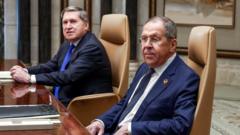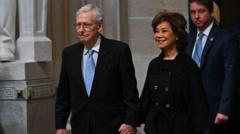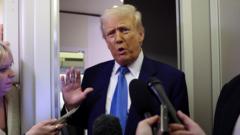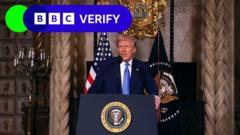The recent talks in Saudi Arabia between senior American and Russian officials signal a potential shift in the dynamics of global negotiations, a development that may deeply affect Ukraine and its allies.
Negotiations Resume: Russia Reasserts Its Role on Global Stage

Negotiations Resume: Russia Reasserts Its Role on Global Stage
In a surprising turn of events, Russia appears to regain its influence in international diplomacy amidst the ongoing conflict in Ukraine.
Despite the continued violence in Ukraine, Russia seems to have positioned itself as a key player, with the image of Moscow negotiating from a place of strength rather than defeat. As the talks unfolded, U.S. Secretary of State Marco Rubio suggested that both sides were taking steps towards ending the conflict. Concurrently, Russian Foreign Minister Sergei Lavrov asserted that attacks on energy infrastructure would not compromise civilian energy supply—a claim met with skepticism, given past incidents of targeted strikes on civilian facilities, raising concerns about Russia's commitment to any agreements.
Furthermore, while U.S. officials aim for negotiation, there are apprehensions surrounding the potential implications of these discussions. Lavrov’s comments and the apparent U.S. willingness to consider a moratorium on such attacks might indicate an easing of sanctions rather than accountability for Russia’s ongoing aggression.
Despite some optimism portrayed by the U.S. about Russia's seriousness in engaging in these discussions, critics point out that no significant territorial concessions or commitments from Russia have emerged. It raises vital questions about the reliability of Russia as a negotiating partner and the consequences of establishing a narrative where aggressors may feel rewarded for continued hostilities.
This repositioning of Russia on the global stage presents a complex scenario for Ukraine and its allies, as they navigate the implications of renewed dialogue that could shape the conflict's trajectory. While the U.S. administration under Trump appears focused on seeking a deal to end hostilities, the lasting ramifications for Ukraine's sovereignty and security remain uncertain. As both parties continue to engage, the stakes for all involved remain high.
Furthermore, while U.S. officials aim for negotiation, there are apprehensions surrounding the potential implications of these discussions. Lavrov’s comments and the apparent U.S. willingness to consider a moratorium on such attacks might indicate an easing of sanctions rather than accountability for Russia’s ongoing aggression.
Despite some optimism portrayed by the U.S. about Russia's seriousness in engaging in these discussions, critics point out that no significant territorial concessions or commitments from Russia have emerged. It raises vital questions about the reliability of Russia as a negotiating partner and the consequences of establishing a narrative where aggressors may feel rewarded for continued hostilities.
This repositioning of Russia on the global stage presents a complex scenario for Ukraine and its allies, as they navigate the implications of renewed dialogue that could shape the conflict's trajectory. While the U.S. administration under Trump appears focused on seeking a deal to end hostilities, the lasting ramifications for Ukraine's sovereignty and security remain uncertain. As both parties continue to engage, the stakes for all involved remain high.























